Makaleler
Ulusal ve Uluslararası Hakemli Dergilerde yayınlanan seçilmiş makaleler
Non-cognitive skills and labour market performance of immigrants
For immigrants with limited education, the personality traits of extraversion and openness significantly boost lifetime employment probabilities, likely by facilitating better integration
| Authors | Alpaslan Akay, Levent Yilmaz |
|---|
Article URL: https://journals.plos.org/plosone/article?id=10.1371/journal.pone.0281048
Citation: Akay A, Yilmaz L (2023) Non-cognitive skills and labour market performance of immigrants. PLoS ONE 18(5): e0281048. https://doi.org/10.1371/journal.pone.0281048
https://journals.plos.org/plosone/article/metrics?id=10.1371/journal.pone.0281048
Abstract
This paper investigates how non-cognitive skills relate to the relative labour market performance of immigrants. Using the German Socio-Economic Panel (SOEP) and the Five-Factor Model of personality as a proxy for the non-cognitive skills, we show that these skills matter for the labour market integration of immigrants in the host country. We use two comparison benchmarks. Compared to an average native, immigrants’ non-cognitive skills, e.g., extroversion or emotional stability, can lead to 5–15 percentage points lower lifetime employment probability disadvantage implying a better overall integration. Comparing immigrants and natives with the same type and level of non-cognitive skills suggests that returns of extroversion and openness to experience are higher among immigrants, leading to 3–5 percentage points lower lifetime employment probability disadvantage. These results are robust with respect to self-selection, non-random returns to the home country, stability of personality, and estimators. Our detailed analysis suggests that non-cognitive skills (especially extroversion) are substitutes for the standard human capital measures (e.g., formal education and training) among low educated immigrants, while there is no significant relative return of non-cognitive skills among highly educated immigrants.
| The Impact of GCR on Local Governments and Syrian Refugees in Turkey In the last couple of years, more than 3.6 million Syrian refugees have been hosted under the “temporary protection” scheme in Turkey. Despite these high numbers Turkey did not have a centralized refugee settlement and integration policy. As a result, various stakeholders including local governments have played critical roles in providing refugee assistance services. This research looks at the role of local governments in delivering services evolving from emergency response to local integration. This article argues that this role with respect to the United Nations’ Global Compact on Refugees (GCR) has to be further strengthened. The data for this research were collected through a comprehensive study based on interviews and surveys carried out in _Istanbul with local authorities, _Istanbul Metropolitan Municipality, and its 39 district municipalities in 2016-2017. Although this research has its focus on _Istanbul as the selected case study, the findings can reveal conclusions relevant to global implications and perspectives. E-Book: The Impact of GCR on Local Governments and Syrian Refugees in Turkey |
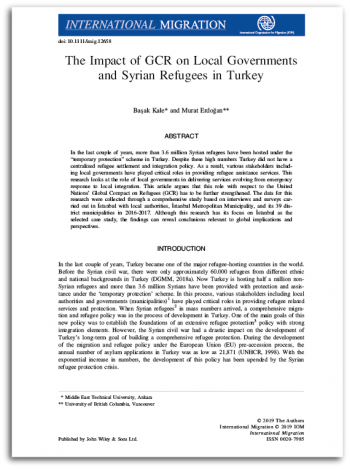 |
| Mehr als nur Gäste Syrische Flüchtlinge im Stimmungsbild der türkischen Bevölkerung E-Book: Mehr als nur Gäste |
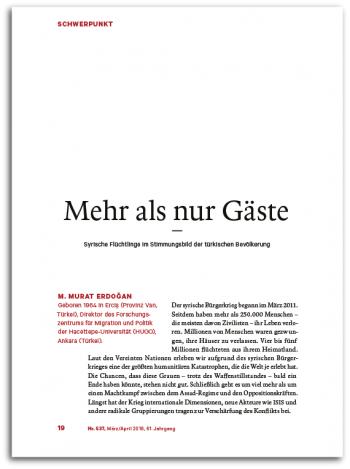 |
Syrians in Turkey: A Framework for Achieving Social Cohesion with Syrians in Turkey The upheaval and civil uprisings in Syria which started in 2011, escalated into a civil war involving numerous actors in short time, thereby leading to one of the severest humanitarian crises the history has ever witnessed. In 2018, the crisis continues, and is unlikely to come to an end in short and medium terms; even after the end of the war, its impact will be felt deeply across the country. Everything has changed for the Syrians, who lost their lives, homeland. and future. The neighboring countries, particularly Turkey which has 911 kilometers long border with Syria, (as well as Lebanon) are affected from the conflict situation. The first mass movement from Syria to Turkey, involving a group of 252 people, took place on 29 April 2011, subsequently followed by growing number refugees fleeing Syria over the course. E-Book: Syrians in Turkey: A Framework for Achieving Social Cohesion with Syrians in Turkey |
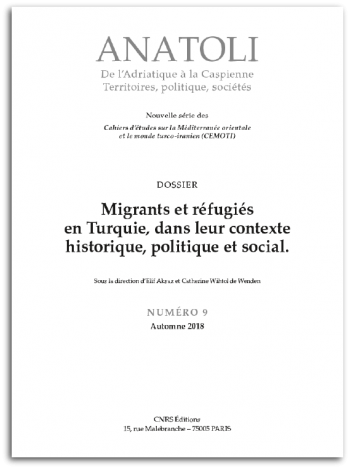 |
| Syrians in Turkey: From Emergency Aid Policies to Integration Policies The most prominent pursuit of this study concerns how to handle the process and what to do for the refugee issue. Two important aspects to be taken into consideration in terms of well crisis management in Turkey are indicated in the study. First of all is the impossibility of a sound process management without registration, and the other is the necessity of synchronous strategy development for both cases of temporariness and permanence. The issue of Syrians in Turkey, even if the Syrian regime collapsed today, should be considered an issue that has potential impacts on Turkey’s prospects in the next decade. It is necessary to develop short, middle and long term strategies, which will fill the gap between the assumptions that “Soon the Syrians will return home by the end of the crisis.” and “The crisis will take longer to resolve, and even if it is granted, a significant amount of the Syrian population will stay here due to the appeal of Turkey or the dire conditions in Syria.” E-Book: Syrians in Turkey: From Emergency Aid Policies to Integration Policies |
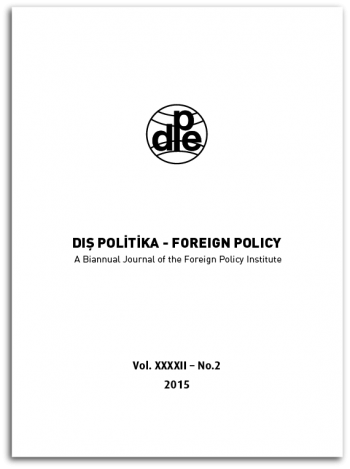 |
| The Implementation of Voting from Abroad: Evidence from the 2014 Turkish Presidential Election Voting from abroad (VFA) is a complex norm and practice due to the multilevel processes, structures and actors involved. This article explores the reasons behind the eventual adoption of this practice within the context of a long and well-known history of emigration in Turkey. During the 2014 Turkish presidential election, emigrants from Turkey were finally allowed to participate from abroad even though legislation giving them this right has been in place since 1995. Based on archival research and fieldwork in Germany and the United States, this article discusses the varying relevance of three central explanatory factors to the implementation of VFA: emigrant lobbying, the electoral expectations of potential benefit by the governing party, and the presence of broader, state-led diaspora engagement policies. The first of these is important but insufficient, whereas the second factor is necessary. Moreover, the presence of broader, state-led diaspora engagement policies is a mediating factor. This article finds that specific actors like political parties may play the crucial role, highlighting the need for critical examination of their role in the implementation process. E-Book: The Implementation of Voting from Abroad: Evidence from the 2014 Turkish Presidential Election |
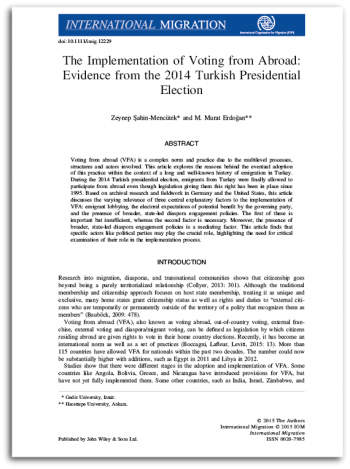 |
| Boğaziçi Bülteni: Suriyeli Mülteciler Göç her dönemde ekonomik ve sosyal bakımdan hem bir kriz hem de bir fırsat olayıdır. Burada önemli olan krizin nasıl yönetileceğidir. Artık büyük ölçüde kalıcı olacağı belli olan ve sadece bugünün değil önümüzdeki yüz yılın meselesi haline gelebilecek Türkiye’deki Suriyeliler olgusuyla ilgili yapılması gereken ilk şey, ciddi bir veri tabanının oluşturulması, buradan hareketle de istihdam alanlarının kontrol edilmesi ve geliştirilmesidir. Bu yapılmaz ise nitelikli Suriyeliler gelişmiş Batı ülkelerine gidecek ve Türkiye’de kalanların Türkiye’ye verecekleri katkı azalacaktır. Kriz kazanca dönüştürülebilir, ancak bunun kısa vadede olması beklenmemeli ve toplumun Suriyelilerden kaynaklanacak sorunlarla karşılaşmaması için politikalar geliştirilmeli ve desteği sağlanmalıdır. E-Book: Boğaziçi Bülteni: Suriyeli Mülteciler |
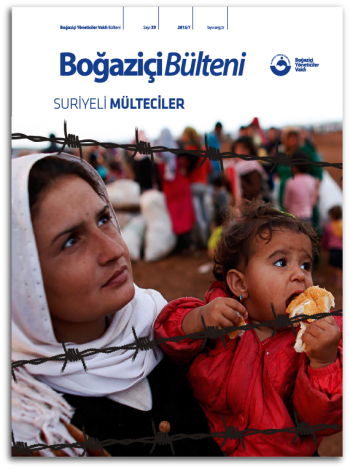 |
| Zerbrechliche Akzeptanz Die politische Dimension der syrischen Flüchtlingskrise in der Türkei E-Book: Zerbrechliche Akzeptanz |
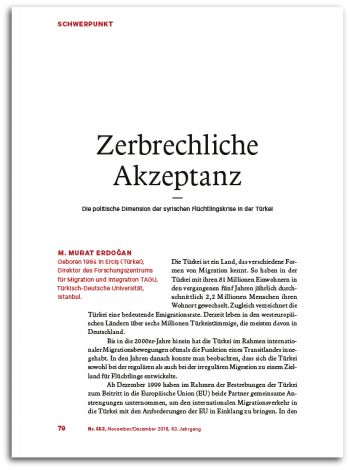 |
| Euro-Turks-Barometre Bu çalışmada 1960’lı yıllardan itibaren Türkiye’den başta Almanya olmak üzere Avrupa’ya giden Türkiye kökenlilerin yarım yüzyılı aşan varlığının bir değerlendirmesi yapılmaktadır. Başlangıçtaki beklentilerin ötesinde gelişen büyük sosyal değişimin ifadesi için sıklıkla vurgulanan “işçi istemiştik, insanlar geldi!” sözünde saklı gerçeklik, artık bambaşka bir duruma ulaşmıştır. Bu çerçevede öncelikle gidiş süreçleri, dönemin öncelikleri, mevcut sayısal özellikler ele alınmıştır. Çalışmada, halen 5 milyonu Avrupa’da olmak üzere 6,5 milyonu aşkın Türkiye kökenlinin varlığının bir ‘diasporalaşmaya’ işaret edip etmediği özel olarak tartışılmaktadır. Çalışmanın ikinci bölümünde ise Hacettepe Üniversitesi Göç ve Siyaset Araştırmaları Merkezi(HUGO) tarafından Türkiye kökenlilerin yoğun olarak yaşadığı 11 Avrupa ülkesinde gerçekleşen ‘Euro-Turks-Barometre (ETB)’ başlıklı kamuoyu araştırmasının verileri değerlendirilmektedir. Çalışmanın önemli tezlerinden birisi, yaşanan sürecin ‘karşılıklı zihniyet transferleri’nin gerçekleştiği güçlü bir etkileşime yol açtığı ve yeni bir kimlik alanının oluştuğuna yöneliktir. E-Book: Euro-Turks-Barometre |
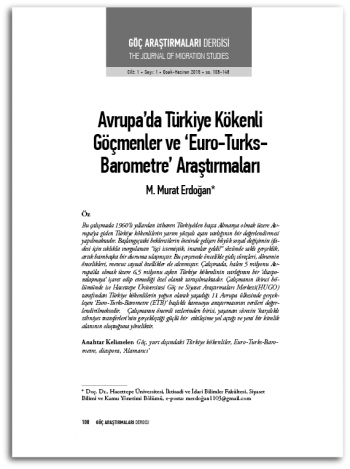 |
“Earned Europeanness”: Turkey and Diaspora Turks in Europe Although the young and beautiful Europa was kidnapped by Zeus, the most important hero of Greek mythology, she has given a general identity to that continent which bears her name. Debates about the exact location of “Europe” and the definition of “Europeanness” have been going on for centuries. Europe has borne its complex identity as a continent until recent times; however, due to its surrounding regions and especially its culturopolitical definitions, it does not have either geographically or culturally exact boundaries. In fact, the positive meaning given in general to “Europe” and “Europeanness” in modern times has increased the number of countries or population groups that wish to share this identity. But “otherness,” the unavoidable face of identity, has created an even more complex situation that is now intertwined with this positive meaning. E-Book: “Earned Europeanness”: Turkey and Diaspora Turks in Europe |
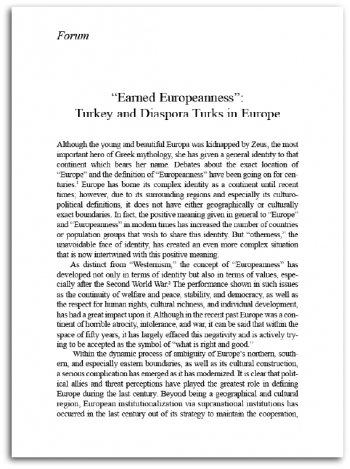 |
| Test of Conscience in Germany? In today’s modern world, the basic human rights containing freedom of speech and belief are secured through the near history of Germany, inversely. The most important gain of the years, 1930s to 1945, within which millions of people were killed only because of their race, religious beliefs, culture or life style, was the legal and administrative precautions which went beyond the borders of states and gained an international guarantee. Moreover, Germany in which intolerance against races, cultures and lifestyles has been experienced at the highest level, even thorough the huge pressure and supervision exerted upon itself, began its process of breaking free from its negative image as one of the liberal democracies which functions very well. E-Book: Test of Conscience in Germany? |
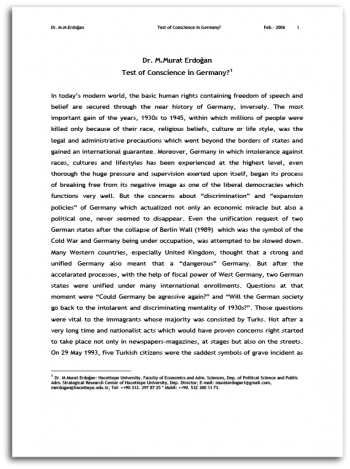 |
